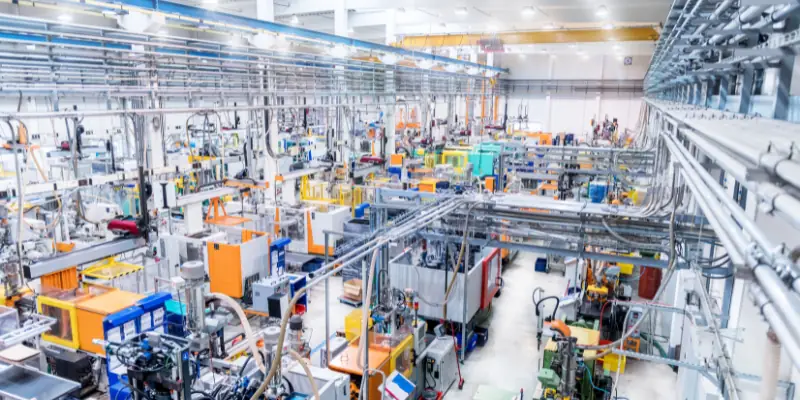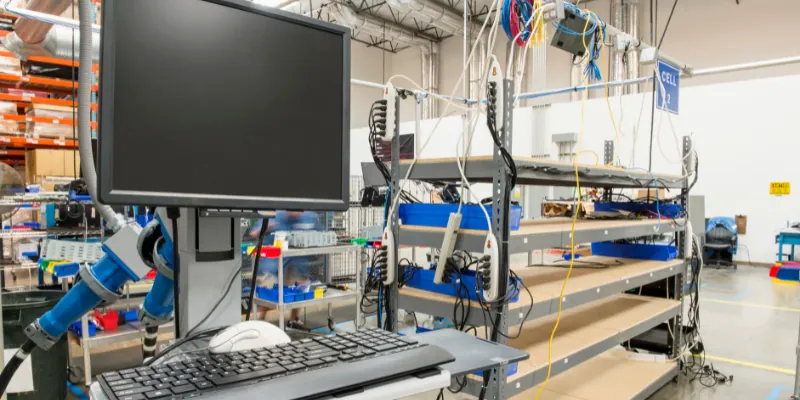Advantages of Computer in Manufacturing for Best Growth
Published: 17 Feb 2025
Computers have transformed the manufacturing industry, making production faster, more precise, and cost-effective. Studies show that automation can increase production efficiency by up to 30% while reducing errors. From robotic arms assembling cars to AI-powered quality control systems, computers play a crucial role in ensuring smooth and accurate manufacturing processes. But what makes them so essential? Let’s explore the key advantages of computer in manufacturing and how they are shaping the future of industries.
Efficiency and Speed
Computers help machines work much faster than humans, making production quicker and more efficient. Automated systems can run 24/7 without breaks, which increases output and reduces delays. Tasks that once took hours or days can now be finished in minutes. Automation removes slow manual work, allowing production lines to move faster with computerized controls. Machines also reduce human errors that can cause delays, ensuring smoother operations. Smart systems can adjust speed based on demand, helping factories meet deadlines more easily.
Orders are processed quickly and accurately, improving customer satisfaction. Since machines do not get tired, downtime is reduced, keeping production steady. With faster processes, companies can produce more products in less time. This allows businesses to grow, expand, and meet higher demands. Overall, automation and computers make manufacturing more efficient, reliable, and productive, helping industries improve their operations and succeed in the market.

Precision and Accuracy
Computers help machines follow exact instructions, ensuring high-quality products. Unlike humans, computers do not make mistakes due to tiredness or distraction. This leads to precise and consistent results in every production batch. Machines work with exact measurements and follow detailed digital instructions, eliminating guesswork and human error. CNC machines can cut materials with extreme accuracy, making sure that every product is identical and meets quality standards.
With high precision, less material is wasted due to mistakes, and parts fit together perfectly. This accuracy improves product durability and reliability, which is especially important in industries like aerospace and electronics. These industries require precise components to function safely and effectively. Customers also benefit from receiving high-quality, defect-free products that perform well. Overall, computers help maintain high standards in manufacturing by ensuring accuracy, reducing waste, and improving efficiency, making products more reliable and long-lasting.
Lower Costs
Computers help businesses save money by reducing labor costs, waste, and errors. Automation allows fewer workers to handle large-scale production, making manufacturing more cost-effective. Machines can produce more in less time, which lowers costs and increases efficiency. Since computers ensure precise cutting and assembly, waste is minimized, and fewer defective products are made. This reduces the costs of replacements and refunds, helping businesses save even more.
Energy-efficient machines also help cut electricity costs, while digital processes reduce the need for paperwork and administrative expenses. Smart inventory management systems prevent overstocking or shortages, ensuring that businesses have just the right amount of materials. Maintenance costs are lower because smart monitoring systems detect problems early, preventing expensive repairs. Over time, these savings help companies recover their investment in technology. By reducing costs and improving efficiency, automation allows businesses to stay competitive, grow, and succeed in the market.

Quality Control
Computers help factories maintain high product quality by detecting defects early. Automated inspection systems use cameras, sensors, and AI to find errors before products leave the production line. This ensures that customers receive reliable and high-standard goods. Machines inspect products more accurately than humans, and AI can detect tiny defects that are hard to see. Faulty products are removed before shipping, making sure that only quality items reach customers.
With consistent quality standards, there are fewer defects and customer complaints. Sensors monitor production in real-time, allowing errors to be fixed immediately and preventing large batches of defective products. Automated systems also improve safety in industries where precision is critical, such as medical and aerospace fields. Companies that maintain high quality build trust with customers, leading to stronger business relationships. Additionally, better quality control reduces waste and saves money, making production more efficient and cost-effective for businesses.
Worker Safety
Computers help reduce workplace injuries by handling dangerous tasks, making factories safer and lowering the risk of accidents. Robots take over hazardous jobs like welding and cutting, protecting workers from burns and injuries. Machines also lift heavy objects, so workers don’t have to strain themselves. This leads to fewer accidents and lower medical costs for companies.
Additionally, machines can operate in extreme temperatures or toxic environments where humans would be at risk. Sensors detect safety hazards early, preventing accidents before they happen. Instead of doing risky tasks, employees can focus on supervising and managing operations. Safety training is also improved with computer simulations, helping workers learn how to handle dangerous situations. Workplaces follow strict safety regulations, and protective barriers and alarms add extra layers of safety. With fewer injuries, workers feel safer and more satisfied, leading to a better work environment and improved productivity.

Faster Production
Computers help factories produce more products quickly and adjust production when demand increases. Manufacturers can easily change machine settings to meet customer needs without making major setup changes. This flexibility allows businesses to scale up efficiently and keep up with market demands. Production can be increased without the need to hire more workers, saving time and costs. Machines can also switch between different products quickly, helping businesses meet seasonal demands with ease.
With automation, more orders can be fulfilled in less time, preventing slowdowns and bottlenecks. Computerized controls make scaling production much easier, allowing businesses to expand without major infrastructure changes. More products mean higher profits, and factories can customize items without slowing down production. This gives businesses a competitive edge, helping them keep up with larger manufacturers. Overall, automation allows companies to grow efficiently, meet customer needs, and succeed in the market while maintaining speed and flexibility.

Inventory Management
Computers help businesses track inventory in real-time, preventing shortages and overstocking. Smart software predicts demand, allowing companies to manage their stock efficiently. This ensures smooth production and avoids delays caused by missing materials. Inventory levels are updated automatically, so businesses always know what is in stock. Raw materials are ordered at the right time, ensuring that factories have what they need without overbuying.
With better inventory management, storage space is used efficiently, and deliveries are scheduled accurately. This makes supply chains more reliable and helps businesses avoid waste from expired or unused materials. Customer orders are processed faster because items are always available when needed. Additionally, stock tracking prevents items from being lost or misplaced. By managing inventory well, businesses improve cash flow, reduce unnecessary expenses, and keep operations running smoothly. Overall, computerized inventory systems help companies save money, reduce waste, and meet customer demands efficiently.
Less Waste
Computers help manufacturers use raw materials more efficiently, reducing waste and lowering costs. Precision cutting and automated production ensure that materials are used accurately, minimizing scraps. Machines follow exact instructions, which means fewer mistakes and less material being thrown away. AI also helps by analyzing waste and suggesting better ways to use resources. This leads to fewer defective products and a more efficient manufacturing process.
Recycling processes are also improved with the help of computers, making factories more eco-friendly. By reducing waste, businesses lower their environmental impact and save money on raw materials. Energy-efficient machines further reduce resource consumption, helping factories meet eco-friendly regulations. With better waste management, companies can improve their sustainability efforts while maintaining high-quality production. Overall, automation and smart systems help businesses operate more efficiently, reduce costs, and protect the environment, making manufacturing more sustainable for the future.
Data Analysis
Computers collect real-time data from production lines, helping businesses improve efficiency and reduce costs. Smart software analyzes this data to find ways to make processes faster and more effective. Machines provide real-time performance data, allowing managers to track progress and identify areas that need improvement. AI helps detect production bottlenecks and suggests solutions to keep operations running smoothly.
By analyzing production trends, businesses can plan better and optimize energy and material usage. Reports generated from this data highlight areas where cost savings are possible. Maintenance schedules can also be planned based on machine performance, preventing unexpected breakdowns and reducing downtime. Quick problem detection helps avoid major failures, ensuring smooth operations. With data-driven insights, businesses can make smarter investment decisions and continuously improve their productivity. Overall, using computers to analyze production data leads to better efficiency, lower costs, and more reliable manufacturing processes.

Remote Monitoring
With smart technology, manufacturers can monitor and control machines from anywhere, making production more efficient. Remote access allows factory managers to adjust settings, fix issues, and track performance without being on-site. This means machines can be controlled using mobile devices, and production can be monitored 24/7. If problems arise, they can be fixed quickly without stopping production, reducing downtime and preventing delays.
Since fewer workers are needed on-site, factory operations become more flexible. Real-time alerts help detect issues early, allowing managers to take action before they become major problems. Remote updates also ensure that software improvements are applied without delays, keeping machines running smoothly. Workers can even oversee multiple factory locations at once, making management more efficient. Strong security features protect systems from cyber threats, ensuring safe and reliable operations. Overall, remote access saves businesses time and money while improving productivity and flexibility in manufacturing.
Computers automate repetitive tasks, reducing the need for manual labor. They help machines work faster and more accurately, speeding up production. This leads to increased output with fewer errors.
Yes! Computers minimize waste by improving accuracy and reducing errors. Automation also lowers labor costs by handling tasks that would require more workers.
Computers use sensors and AI to detect defects in products. This helps manufacturers catch issues early and prevent faulty products from reaching customers. As a result, quality improves, and waste is reduced.
While automation reduces manual tasks, humans are still needed to manage, program, and maintain machines. Many jobs are shifting toward supervising and troubleshooting technology. Instead of replacing workers, computers help them work more efficiently.
Almost every manufacturing industry benefits, including automotive, electronics, food production, and textiles. Computers help improve precision, speed, and quality in all these fields. Even small businesses use computers for design, inventory, and automation.
The biggest challenge is the high initial investment required for automation. Factories also need skilled workers to operate and maintain the technology. However, over time, the benefits outweigh the costs by improving efficiency and reducing waste.
Computers control robotic machines that handle dangerous tasks like welding or lifting heavy objects. This reduces the risk of injuries in factories. Workers can focus on monitoring and supervising rather than doing hazardous tasks.
CNC (Computer Numerical Control) is a system that controls machines like drills and cutters using computer programs. It ensures precision, making parts exactly as designed. This reduces errors and speeds up production.
The future will see more AI, IoT (Internet of Things), and smart factories where machines communicate with each other. This will further increase automation, reduce costs, and improve efficiency. Manufacturers who adopt these technologies will stay ahead in the competition.
Yes! Even small businesses can benefit from computers for inventory management, design, and automation. Using technology helps them compete with larger companies by improving efficiency and reducing costs.
Conclusion
So guys, in this article, we’ve covered the advantages of computers in manufacturing in detail. We’ve seen how technology is shaping production lines and driving efficiency. If you’re still relying on traditional methods, I recommend taking a closer look at how computers and automation can streamline your operations. The sooner you adapt, the quicker you’ll see improvements in cost, quality, and productivity. Ready to upgrade your manufacturing process? Take the first step today!

- Be Respectful
- Stay Relevant
- Stay Positive
- True Feedback
- Encourage Discussion
- Avoid Spamming
- No Fake News
- Don't Copy-Paste
- No Personal Attacks

- Be Respectful
- Stay Relevant
- Stay Positive
- True Feedback
- Encourage Discussion
- Avoid Spamming
- No Fake News
- Don't Copy-Paste
- No Personal Attacks
